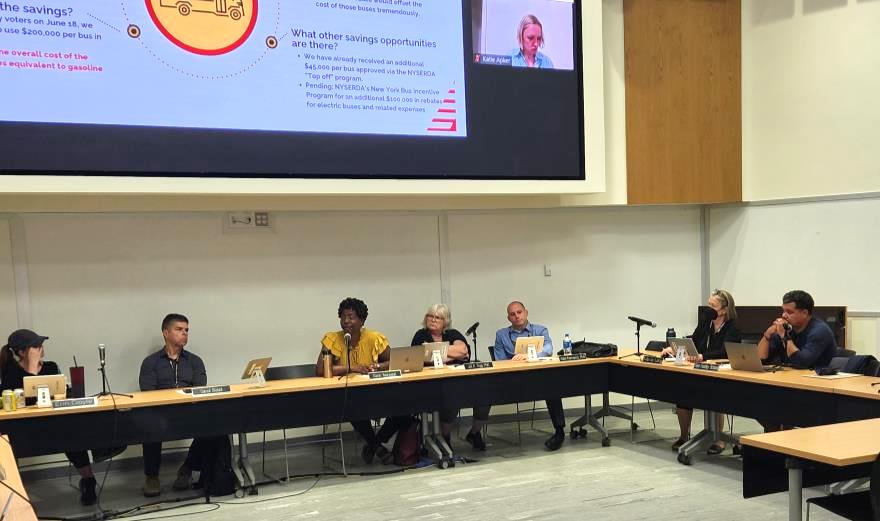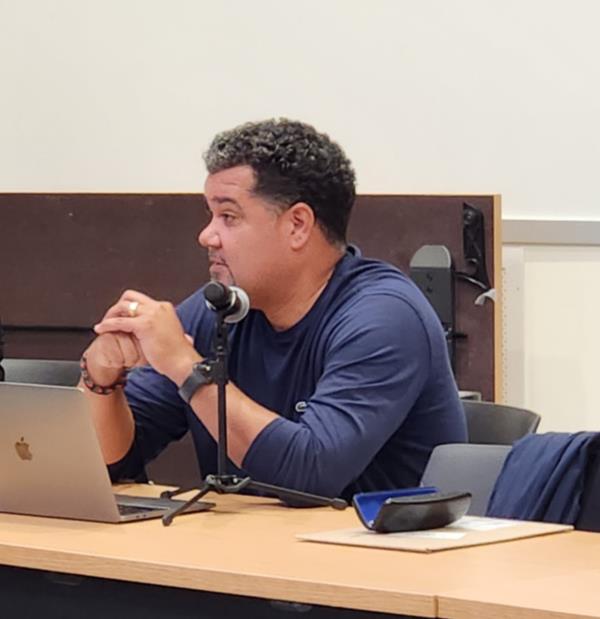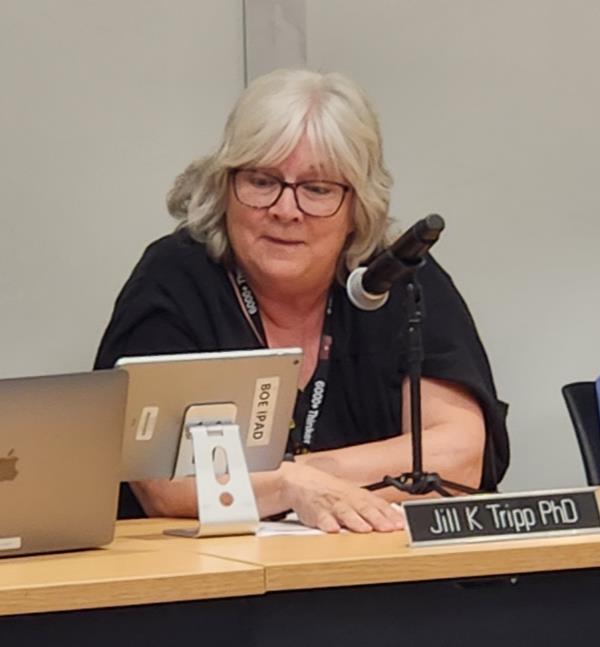
by Robert Lynch; June 3, 2024; additional reporting June 4, 2024
Whether by happenstance or by intent, the visor on Erin Croyle’s cap blocked us from seeing the emotion in her eyes Monday night. But it could not hide her words. “We need to make it very clear,” the Ithaca School Board member said, that if we are forced to accept a Contingency Budget, “our schools would be a shell of themselves.”
At past meetings, Croyle, the mother of a disabled Ithaca student and the Board’s leading advocate for spending what it takes to ensure quality instruction, has nearly cried when critics faulted the district’s budget as being bloated, and when Board colleagues agonized over where and how to cut, and cut… and cut even more, just to find a level of school spending and taxation that voters will approve this second time around.
Nonetheless, Monday night, Erin Croyle joined her six colleagues at the meeting table and a seventh on Zoom to endorse and send to Ithaca’s voters June 18th a trimmed-down $163 Million next year’s budget, one that would set projected spending low enough so that its tax levy increase would fall under New York State’s tax cap.
And because the budget would be tax cap-compliant, the resubmitted proposal would require only a simple majority of support to pass, not the 60 per cent super-majority of the electorate that the earlier-rejected $168 Million spending plan would have needed, yet never got.
It would have been a surprise had the Board Monday endorsed anything except the Tax Cap Budget (otherwise known as the “Re-vote Budget.”) For more than three hours on Tuesday, May 28th, the Ithaca Board of Education had agonized over the budget its voters had rejected. Its members had increasingly coalesced around revisions that would contain the tax levy within the cap and shrink the earlier budget’s 8.4 per cent levy increase, rejected May 21st, to a mere 2.92 per cent.
The $168.9 Million proposal put to Ithaca’s voters in May lost in a landslide, with more than seven out of ten opposing it. State law permits a school board to resubmit a failed budget only once, whether modified or not. Recognizing the margin of loss, no one on the Board of Education during its post-mortem meetings has given serious consideration to submitting the exact same budget a second time. Rather, the issue has been how deeply to cut spending, while at the same time bracing for the stark consequences of a second potential defeat.

Should a revote fail, state law would mandate a “Contingency Budget” for next year. It would lock-in the next year’s tax levy at the current year’s level. It would also usher in a host of draconian austerities that scare parent-educators like Erin Croyle. Class sizes would invariably increase. Equipment could not be bought. Buildings could be used only for instructional programming, thereby severely curtailing their after-school use. And extracurricular activities like fine and performing arts could see major cuts.
“There would be nothing after-school except sports,” Croyle warned. “And extracurriculars would be reduced. I mean, that’s a terrifying prospect,” she said.
No member of the Ithaca Board of Education had the stomach Monday for adopting a Contingency Budget for the year ahead. But such an austere option remained the only alternative on the table to the tax cap-tied plan the Board ultimately embraced. A more costly compromise, one that would have hiked spending by 4.1 per cent, an increase in line with the Consumer Price Index, had already been unceremoniously scratched from consideration at the meeting one week earlier.
“This is the community’s opportunity to tell us what they think,” Jill Tripp, the Ithaca Board of Education’s most fervent advocate of fiscal frugality, told Board colleagues Monday. And Tripp gave the tax-cap limiting “Re-vote Budget” her stamp of approval.
“It’s not a perfect budget,” Tripp acknowledged. “It doesn’t have everything that I wanted. And it has some things I didn’t want. But I believe we’ve come pretty much to consensus on this, and I will support this budget.”
“I think we’re headed in the right direction, and I expect that we’ll continue in the direction that we started on,” Jill Tripp observed. “So I’ll be voting yes. I hope you’ll join me,” she said.
Board president Dr. Sean Eversley Bradwell came to a similar conclusion.
“It’s not the budget that I want, but the budget I can support,” Eversley Bradwell said, the Board President echoing his almost identical assessment of the budget compromise made nearly a week earlier.

Whereas the Ithaca Board of Education strained over budget numbers at its previous meeting, Monday’s decisions came quickly. It completed its public session in only about three-quarters of an hour. Seven of the Board’s nine members attended in the High School’s York Lecture Hall. Katie Apker Zoomed into the meeting. For reasons never explained, Eldred Harris—like Croyle, a staunch backer of costlier alternatives—joined the meeting only after the Board had taken its key budget votes.
As was discussed in greater detail May 28th, the Re-vote Budget endorsed Monday would eliminate an estimated 22 teaching positions within the Ithaca City School District (ICSD). When compared with the higher budget that voters rejected in May, a full 39 teaching positions would be cut.
Deputy School Superintendent Lily Talcott told the Board that based on a five-year average, about 58 teachers retire or resign the school system annually. Therefore, administrators believe the proposed teaching reductions can be accomplished through attrition.
But should a Contingency Budget become the voter-dictated default alternative, administrators have not forecast publicly how deeply instructional staff might be cut.
Yet perhaps the financial numbers give an idea. The “Re-vote” compromise, embraced by the School Board Monday, would force $5.9 Million less in spending compared to May’s voter-rejected budget. A Contingency Budget would cut $9 Million from the May submission’s spending total.
A Contingency Budget would spend $159,864,221, just a fraction of a per cent above this year’s spending level. That budget’s tax levy would remain at this year’s $107,714,290. The $163 Million Re-vote budget would set its tax levy a bit higher, at $110,862,167.
District Chief Operating Officer Amanda Verba brought one unplanned surprise to the Board of Education’s meeting Monday. After the district had earlier this year been denied a hoped-for grant to subsidize the purchase of electric school buses, Verba informed the Board that the U.S. Environmental Protection Agency has just awarded the ICSD $800,000 in rebates to purchase electric vehicles.
The district can use $200,000 of the rebate money to reduce the price of each electric school bus it buys. Not yet knowing of the award, the Board last week trimmed from four to just two the number of electric buses it will ask voters to purchase in the June 18th revote.
An eight-bus purchase, including the four electric vehicles, had been rejected by voters in May along with the budget.
The rebate money, Verba informed the Board, puts an electric bus’s price equivalent to that of a gasoline bus. Nonetheless, the Board cannot retract or revisit last week’s action. So half of the rebate money will have to wait its turn and be applied to the two remaining vehicles next year.
“The reality of the timing of it,” the administrator said, forces the delay.
###

